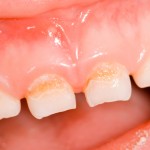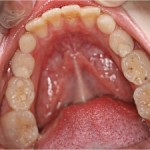Matt Field summarises the findings of a recent cluster RCT that uses internet-based prevention (an Australian programme called Climate Schools) to reduce alcohol and cannabis use, truancy, psychological distress and moral disengagement.
[read the full story...]Small trial finds caries prevention potential in new silver fluoride agent

Dental caries is one of the commonest diseases of childhood and management is particularly challenging in underprivileged populations. In recent years there has been increasing interest in silver diamine fluoride. However, it tendency to stain carious tissue black and potential to cause oral mucosal lesions limit its potential use. Nano Silver Fluoride ® (NSF), a [read the full story…]
Review finds limited evidence for effectiveness of Casein phosphopeptide-amorphous calcium phosphate in caries prevention

Dental caries remains a major public health problem. It has been demonstrated in in vitro studies that Casein phosphopeptide-amorphous calcium phosphate (CPP-ACP) has a remineralising effect on enamel lesions. The aim of this systematic review was to assess the long-term (>3 months) remineralizing effect of CPP-ACP on early caries lesions in vivo compared with placebo [read the full story…]
Prevention toolkit from Public Health England

Public Health England has just launched the third edition of the evidence-based toolkit for prevention. The first edition was published in 2007 and is considered to have been important in ensuring consistency of advice delivered as part of preventive treatment plans. Within England it has also helped inform commissioners develop dental contracts that encourage prevention. [read the full story…]
Preventing workplace depression: are there universal interventions that work?

Mental health in the workplace is an area that we’ve blogged about a few times before. This blog features a recent review by Tan et al on workplace interventions for depression. Mental disorders are the leading cause of sickness absence (Harvey, 2009 and Henderson, 2011), and depression in particular is predicted to be the leading [read the full story…]
Insufficient evidence that probiotics can prevent caries, but they can reduce the mutans streptococci counts in the short term

Probiotics have been used in the management of a wide range of conditions and have been shown to have a beneficial effect in gastrointestinal disease for example. A potential role in the prevention of caries has been suggested and the aim of this review was to evaluate the caries preventive effect of probiotics. Searches were [read the full story…]
Study suggests that a risk based non-operative caries treatment and prevention approach may be more cost effective than traditional approaches

Sadly caries remains a significant public health problem across the world, particularly in children. The aim of this study was to assess the cost-effectiveness of caries treatment and prevention strategies in the Netherlands. The study was conducted alongside a randomised controlled trial (RCT) evaluating the effects of two caries prevention strategies compared with regular dental [read the full story…]
Dental Interventions to prevent caries in children – SIGN Guideline 138

The Scottish Intercollegiate Guidelines Network (SIGN) have just launched a new guideline on caries prevention in children. The guideline replaces two existing guidelines; SIGN 47 on preventing dental caries in children at high caries risk and SIGN 83 on prevention and management of dental decay in the pre-school child. The guideline was developed using SIGN [read the full story…]
Adapting smoking cessation interventions to meet the needs of black and minority ethnic populations

Tobacco use is the single most important preventable cause of mortality and morbidity in developed countries. However, what is less widely appreciated is that as the overall prevalence of smoking has declined, tobacco use has become an increasingly important driver of health inequalities. For example, the prevalence of smoking in the United Kingdom has declined [read the full story…]
The dark side of universal prevention: Limited effectiveness and harmful effects of classroom-based CBT in preventing adolescent depression

Depression is a common problem in adolescence, with statistics showing that around 20% of young people will go through at least one clinically depressive episode by the age of 18 years. Given the significant impairment and deleterious consequences of depression, sustained efforts have been dedicated to preventive and early intervention. In a recent large trial [read the full story…]


